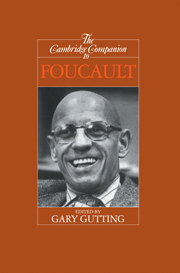Book contents
- Frontmatter
- Introduction: Michel Foucault: A user’s manual
- 1 Foucault’s mapping of history
- 2 Foucault and the history of madness
- 3 The death of man, or exhaustion of the cogito? Translated by Catherine Porter
- 4 Power/Knowledge
- 5 Ethics as ascetics: Foucault, the history of ethics, and ancient thought
- 6 The ethics of Michel Foucault
- 7 “What is enlightenment?”: Kant and Foucault
- 8 Modern and countermodern: Ethos and epoch in Heidegger and Foucault
- 9 Foucault and Habermas on the subject of reason
- 10 “Between tradition and oblivion”: Foucault, the complications of form, the literature of reason, and the aesthetics of existence
- 11 Foucault, feminism, and questions of identity
- 12 Foucault, Michel, 1926–Translated by Catherine Porter
- Bibliography
- Index
7 - “What is enlightenment?”: Kant and Foucault
Published online by Cambridge University Press: 28 May 2012
- Frontmatter
- Introduction: Michel Foucault: A user’s manual
- 1 Foucault’s mapping of history
- 2 Foucault and the history of madness
- 3 The death of man, or exhaustion of the cogito? Translated by Catherine Porter
- 4 Power/Knowledge
- 5 Ethics as ascetics: Foucault, the history of ethics, and ancient thought
- 6 The ethics of Michel Foucault
- 7 “What is enlightenment?”: Kant and Foucault
- 8 Modern and countermodern: Ethos and epoch in Heidegger and Foucault
- 9 Foucault and Habermas on the subject of reason
- 10 “Between tradition and oblivion”: Foucault, the complications of form, the literature of reason, and the aesthetics of existence
- 11 Foucault, feminism, and questions of identity
- 12 Foucault, Michel, 1926–Translated by Catherine Porter
- Bibliography
- Index
Summary
Many commentators have noted a marked change of emphasis in Foucault's later thinking about issues of truth, ethics, and social responsibility. For some, this change was characterized chiefly by a certain relaxation of the skeptical rigor – the attitude of extreme Nietzschean suspicion with regard to truth-claims or ethical values of whatever kind – that had hitherto played a prominent role in his work. Thus, according to Roy Boyne, the shift can be located with a fair degree of precision as occurring between Volume One of The History of Sexuality (where Foucault's genealogies of power/knowledge seem to exclude all notions of truth, enlightenment, self-understanding or effective political agency) and the later, posthumous volumes where this doctrine gives way to a sense of renewed ethical and social engagement. In this work, as Boyne reads it,
there is… the suggestion of a certain Utopian residue. It pertains to the exercise of discipline, but this time it is not so much a question of an alienating imposition, rather one of normatively reinforced self-regulation…. The stake in this contest is freedom. A self ruled by the desires is unfree. Therefore moderation equals freedom. Thus the exercise of self-mastery is closely connected to the state of freedom.
This is not to deny that there remain great problems – especially from the standpoint of present-day cultural and gender politics – with Foucault's appeal to those techniques of self-fashioning that he finds best embodied in the ethos of Classical (Graeco-Roman) sexual mores. Although it offers an escape-route of sorts from his earlier outlook of cognitive and ethical skepticism, it still leaves certain crucial questions unanswered.
- Type
- Chapter
- Information
- The Cambridge Companion to Foucault , pp. 159 - 196Publisher: Cambridge University PressPrint publication year: 1994
- 11
- Cited by

